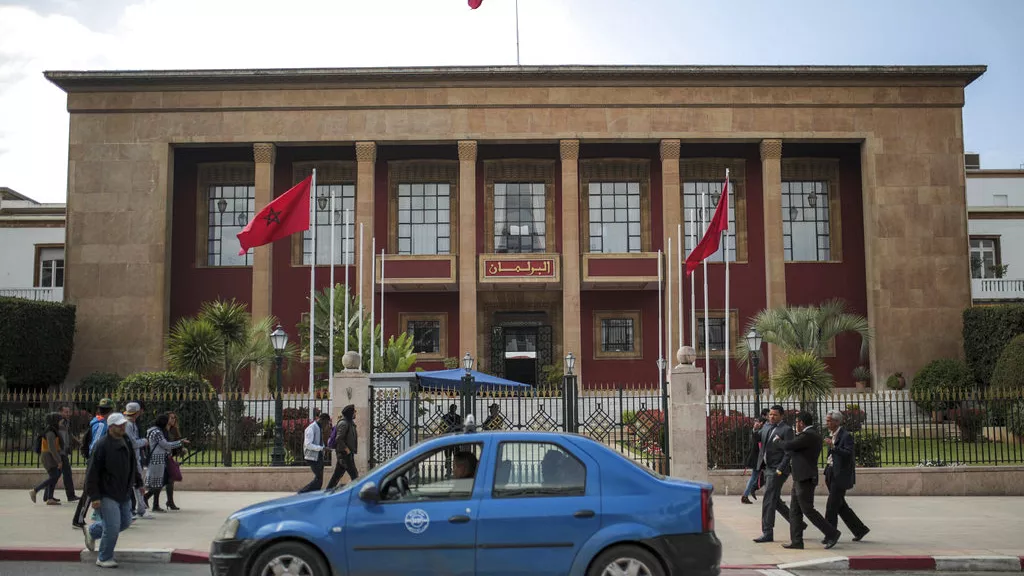Moroccan journalist sentenced to 18 months after remarks about a politician
3 min read
The parliament building in Rabat, Morocco

The parliament building in Rabat, Morocco
A Moroccan journalist, Hamid Mahdaoui, was sentenced to 18 months in prison and fined the equivalent of $150,000 for defaming a prominent politician, a ruling that has drawn widespread criticism from press freedom advocates. Mahdaoui, the editor-in-chief of the news site Badil.info, was convicted after posting a video accusing Justice Minister Abdellatif Ouahbi of corruption and fraud.
Mahdaoui’s legal troubles began after Ouahbi filed a defamation complaint against him, following the journalist’s accusations that the minister was involved in fraudulent activities. Ouahbi denied the charges, and the case has highlighted concerns about the growing repression of journalists in Morocco. The charges were brought against Mahdaoui under the country’s penal code, rather than the press code typically used for media-related offenses, a move that press freedom groups argue is an attempt to stifle independent reporting.
Mahdaoui’s legal troubles began after his video on Badil.info made waves. The video alleged that Ouahbi was involved in corruption, especially after a drug trafficking scandal in 2023, when a jailed Malian drug dealer implicated members of Ouahbi’s political party, the royalist Party of Authenticity and Modernity (PAM), in a large drug trafficking ring. Ouahbi denied any wrongdoing, but the controversy surrounding his party contributed to the heightened tensions between Mahdaoui and the Moroccan government.
The case against Mahdaoui has drawn sharp criticism from international press freedom organizations. Reporters Without Borders (RSF) condemned the sentence, with the group’s North Africa representative, Khaled Drareni, calling it “a misuse of the justice system to intimidate and silence the press.” The organization argues that the conviction is part of a broader crackdown on journalists who challenge powerful figures or report on sensitive topics like corruption and political scandals.
Mahdaoui is no stranger to legal battles. In 2017, he was imprisoned for three years after he expressed support for activists involved in protests against Morocco’s social and economic inequalities. His conviction at that time stemmed from accusations that he had failed to report a claim made by a Dutch-Moroccan man about arms shipments to the protesters. Mahdaoui later explained that he did not take the information seriously and thus did not pass it on to authorities. His 2017 conviction was widely criticized as politically motivated, and it added to the concerns about the country’s treatment of independent media and free speech.
Morocco has faced growing international scrutiny in recent years for its treatment of journalists, activists, and critics of the government. In 2022, the government came under fire for its crackdown on independent reporting, with several journalists imprisoned for allegedly insulting the government or royal family. However, the country did make some moves toward easing press restrictions in July 2023 when King Mohammed VI pardoned and released three prominent imprisoned journalists — Omar Radi, Taoufik Bouachrine, and Soulaimane Raissouni — who had been sentenced on charges widely seen as politically motivated.
Mahdaoui’s conviction has sparked renewed concerns about the freedom of the press in Morocco, especially for journalists who investigate corruption or political scandals. His attorney, Mohamed Hedach, confirmed the sentence on Monday and said Mahdaoui had not yet decided whether to appeal the verdict. The international community, along with Moroccan press freedom advocates, continues to watch the case closely, as it could signal further crackdowns on media freedom in the country.
The ongoing case highlights the challenges faced by journalists in Morocco, where reporting on corruption and government mismanagement can carry significant personal and legal risks. For many, Mahdaoui’s conviction is a reminder of the broader climate of fear and censorship that journalists face in Morocco and other countries where press freedom is under threat.
As the case develops, press freedom organizations and civil society groups continue to call for the immediate release of Mahdaoui and a reversal of his conviction, arguing that journalists should not be punished for holding the powerful to account.